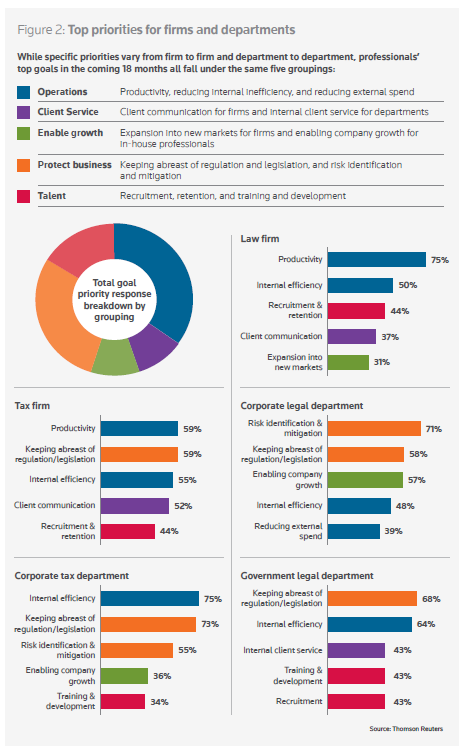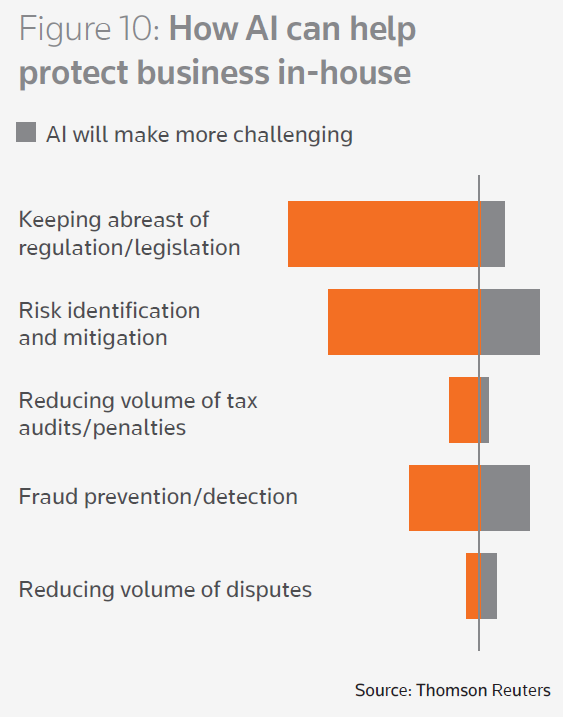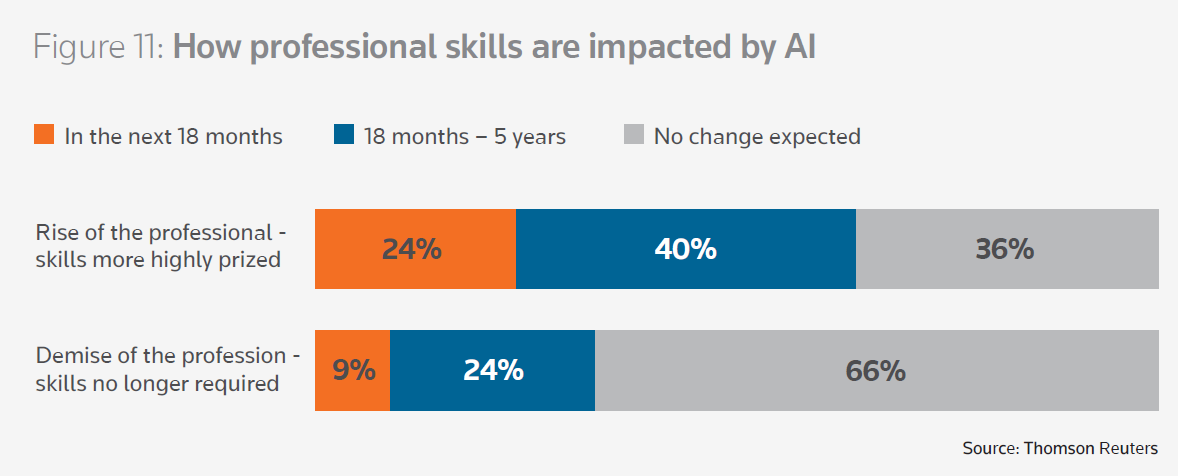While professional services firms are often focused on operational efficiencies, the “Future of Professionals” report reveals their clients often prioritize protecting the business — and those clients want help knowing where AI fits in
Professional services industries are set to dramatically change, and thanks to artificial intelligence (AI), it could happen quickly. According to the recently released Future of Professionals report from Thomson Reuters, 67% of professionals believe the emergence of AI and generative AI will enact either “transformational” or “high impact” change on their industries. That’s more change than professionals expect from a potential economic recession (53%), increasing regulation (51%), or an explosion in data volumes (50%).
Naturally, that should mean most professionals are gearing up for AI’s implementation. As it turns out, however, that implementation may not look the same in corporations and outside firms because firms and corporations have different organizational priorities. A technology as potentially transformational as AI or generative AI can have a lot of use cases, after all, ranging from question-answering services to contract and document drafting to synthetization of large swaths of data. It’s expected that organizations will align these different AI use cases with the priorities that best fit their organization — and those can differ depending upon whom you’re talking to.
As a result, for law firms and tax & accounting firms alike looking to connect with clients over artificial intelligence, it’s worthwhile to note that while the technology may be similar, the goal of the technology may be different. And offering worthwhile AI advice — advice corporate clients say they desire — starts with understanding how clients’ priorities may differ from your own.
What a corporation wants
When law firms and tax & accounting firms talk about their priorities for growth over the next 18 months, they’re often looking at internal operations as the primary driver of that growth. More firm respondents ranked productivity as a priority over that time period than any other option; in fact, with 68% selecting it as one of the top five priorities for their firm. Another operational priority, internal efficiency, came second at 52%.
Given current AI use cases then, it’s no surprise that firms see AI as a crucial pathway to get to those operational efficiencies. More than three-quarters (76%) of firm respondents said they believed AI can help increase productivity, while 64% said they believed AI can increase the efficiency of internal processes. As one law firm respondent put it: “I hope that AI can help us look at current inefficiencies and suggest new ways to achieve similar results that allows us to produce more quality work.”

However, operational efficiencies aren’t the only end-goal in professional services. While corporate respondents said they were also interested in operational efficiencies, in many cases, that came second to the ultimate priority of protecting the business.
Indeed, corporate law departments ranked risk identification and mitigation (71%) and keeping abreast of regulation and legislation (58%) as their top two priorities over the next 18 months, higher than either internal efficiency. And while corporate tax departments did rank internal efficiency (75%) as their top short-term priority, keeping abreast of regulation and legislation (73%) and risk identification and mitigation (55%) were shortly behind as common priorities.
By and large, corporate respondents believe AI will be able to help in those top priorities of protecting the business as well. More than half (52%) said keeping abreast of regulation and legislation was one of the top five areas where AI can help, while just under half (47%) said the same of risk identification and mitigation.
When asked how AI can help achieve those goals, many respondents pointed to the power of synthesizing data. “Tax law is always changing, and as tax professionals you are sometimes so busy with your everyday work that you don’t have time to sit aside and do a deep dive in new tax law changes,” explained one corporate tax respondent. “So having a platform that can provide clear and concise information in a timely manner would be very helpful in today’s world.”

A fit for firms
Some law firm and tax firm professionals may read quotes like that and begin to worry. After all, synthesizing complex information and alerting clients of changes has long been a staple of firm-client relations. However, just under two-thirds (64%) of respondents said they see a rise in the appreciation of their professional skills, with almost one-quarter (24%) predicting the result would come over the next 18 months. Just one-third of respondents (33%), meanwhile, said they see a darker outlook, with AI resulting in the demise of their profession and their skills no longer being in demand.
Why would more people be optimistic about AI’s effect on their skills? It could come with an increased understanding of what AI actually does. The idea of a robot lawyer or tax professional isn’t practical at the current time; even high-powered new generative AI technologies are only optimized to tackle repetitive tasks, freeing professionals up for the work they actually want to do. As one corporate tax respondent said: “Expect that it will be able to do some tasks that a human currently performs (tax computations). The human can then perform the analysis and higher-level tax work (risks, opportunities, controversy, etc.).”
At the very least, corporate respondents don’t appear to believe AI will replace their firm partners. In fact, in some cases, they feel they may need them more. When asked how they expect AI to impact their profession, corporate respondents said that by and large, the technology could have a transformative impact, but also with a lot of necessary attention and care paid to how exactly these technologies are implemented. “In the near term, it will require a deep dive into ethics, revisions of company policies, and development of protocols to ensure that it is being used in the business context appropriately,” explained one corporate law respondent.

This is where legal and tax firms can currently find an opening. Corporate clients see the opportunity with these tools, but they also see the risk. “If implemented correctly with organizational growth in mind, it could be absolutely amazing,” said one corporate tax respondent. “If not, then the workload of the staff would double, and the business would suffer.”
Ultimately, incorporating AI isn’t just a technology initiative. It is inherently a business question, and one that needs to align with the overall priorities of the company. By understanding where AI use cases align with those priorities and what corporations actually want to get out of AI, professional services firms can be better equipped to tackle the AI revolution with their own ultimate goal in mind: giving the best possible advice to their clients.







